Are you thinking about starting a career in tech but not sure if it’s the right move?
I get it. Any big decision about your future comes with a lot of questions, and tech is no different.
You're probably thinking:
Don't worry because I'll answer all this and more.
In this guide, I’ll walk you through the real pros and cons of working in tech, help you figure out if it’s a path worth exploring, and share a few resources to help you get started.
Let’s get into it…
The pros of working in tech
So let’s look at the pros first and why I think this is one of the best industries to work in.
You don’t need a degree to get started
One of my absolute favorite things about the tech industry is that you don’t need a college degree to get hired. This is because tech only cares if you can do the work. They don’t care where or how you learned, just so long as you’ve got the skills to back it up.
And sure, some companies may ask for a degree in the big 5:
Meta
Amazon
Apple
Netflix
Google
Otherwise known as MAANG.
But honestly, even these companies are now posting roles asking for either a degree OR relevant experience.
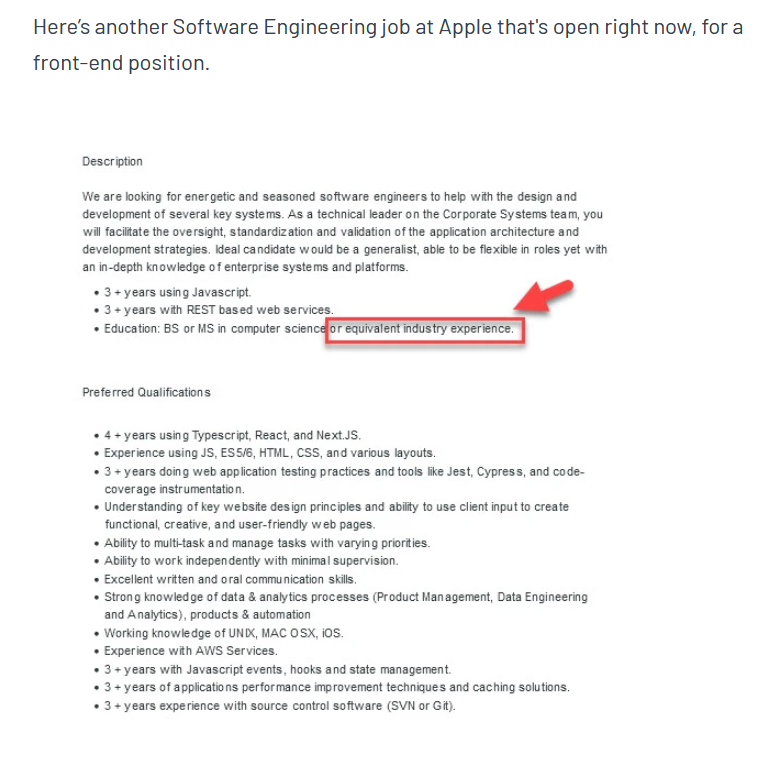
This is why the vast majority of people in the industry are self taught, learning via YouTube, online courses, in person bootcamps, or a mix of all three. And because of that, the cost of getting into tech is a fraction of what you’d pay for a university degree.
No joke, but you can learn what you need at around $50 a month instead of hundreds of thousands for college. Heck, there are even specific courses you can take that replicate a CS degree:
Online Computer Science Degree
15 milestones 13 courses
Learn all the modern skills of a Computer Science graduate + more!
Dive into different fields like Web Development, AI & Machine Learning, Data Science, Database Administration and Ethical Hacking
Get your online computer science degree and actually get hired
Earn on average per year:
$110,293
US salary data collected from Indeed, LinkedIn, and Web3.career 2026.
I know it sounds too good to be true, but I interview students who do this all the time.
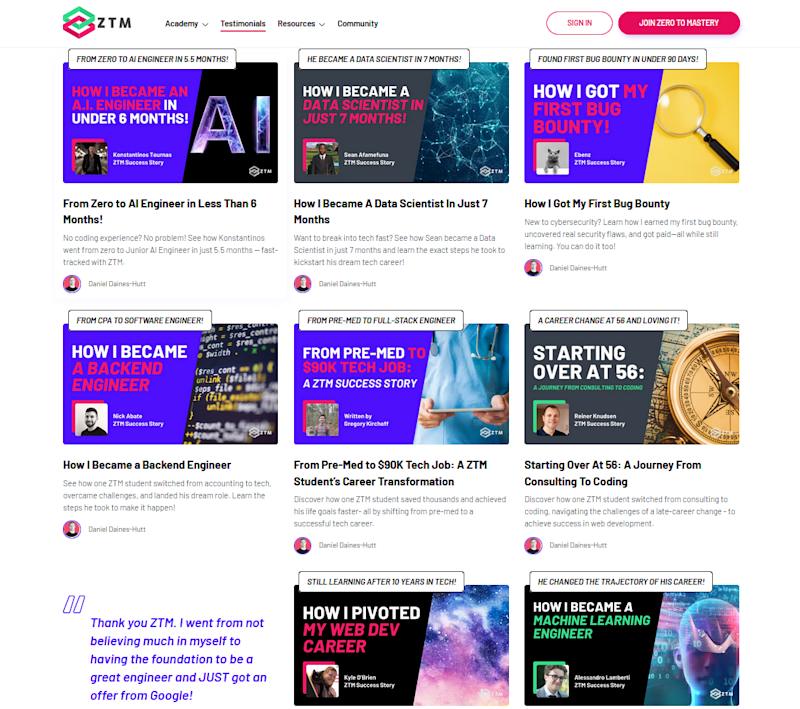
We’ve had people get hired at each of those companies listed above and more. Some were waiters or stay at home parents before this. Some were right out of high school.
Even better? It’s how short the time frame is to learn these skills.
You can go from zero experience to job-ready in about 6 to 9 months if you stay consistent. Some people do it even faster, (we’ve had students do it in just 5 months!), but that depends on how much time and focus you can give it.
Not bad for learning an entirely new skill from scratch and completely changing (or starting) a new career right?
You just have to do the work, and then prove it in the interview.
This usually means:
Taking an online course to learn the fundamentals and trending new skills
Building the projects in the course as you go through it (+ to help you learn)
Sharing those projects in a portfolio and answering questions about the topic in an interview
We cover the entire process in this course below:
Not bad right?
Especially when you add in all the other pros…
The salaries are fantastic
Money isn’t everything, but it does matter. And in tech, the pay is usually better than what you'd find in a lot of other industries, especially when you're just starting out.
Even entry-level roles like support engineers, junior developers, or QA testers often start in the $50k–$70k range, depending on the company and location. And that’s before you start stacking experience, moving up, or shifting into higher-paying specializations like cloud, cybersecurity, or AI and Machine Learning.
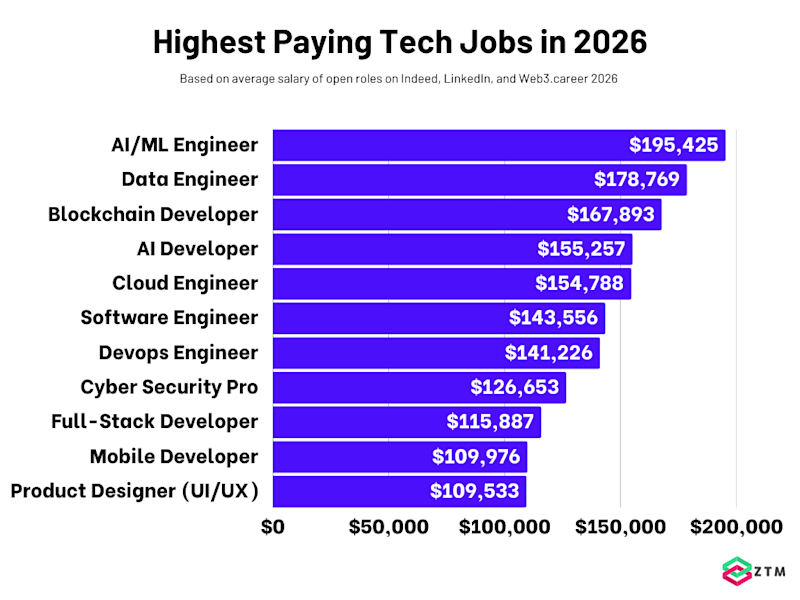
Not bad right? Some of the salaries at those larger companies + benefits can be around $300k or more per year!
The best part of all this is that you don’t need to follow a set path before you can apply to those higher earning roles.
Sure you need to learn the right skills to move into a Senior position, but it's not like you need to build websites for a few years before switching into something else. You can choose an area like Cyber Security, Data Analytics, Machine Learning or AI right from the beginning and train specifically for that.
Want to fast track this?
We have roadmaps to help you get hired ASAP for almost any major career in tech, as well as a quiz to help you decide which role and path to take:
Want a career in tech but not sure what to do?
- Find the perfect career path for you based on your experience and goals
- Get a personalized step-by-step roadmap to follow
- Go from zero to hired in your dream career
- 👇 Take our free, 2-minute quiz to make it happen
Tech is always growing
Another great thing about the tech industry is the growth and opportunity available.
According to the US bureau of labor statistics, the tech industry is forecast to add around 356,000 new jobs each year, for the next 7 years.
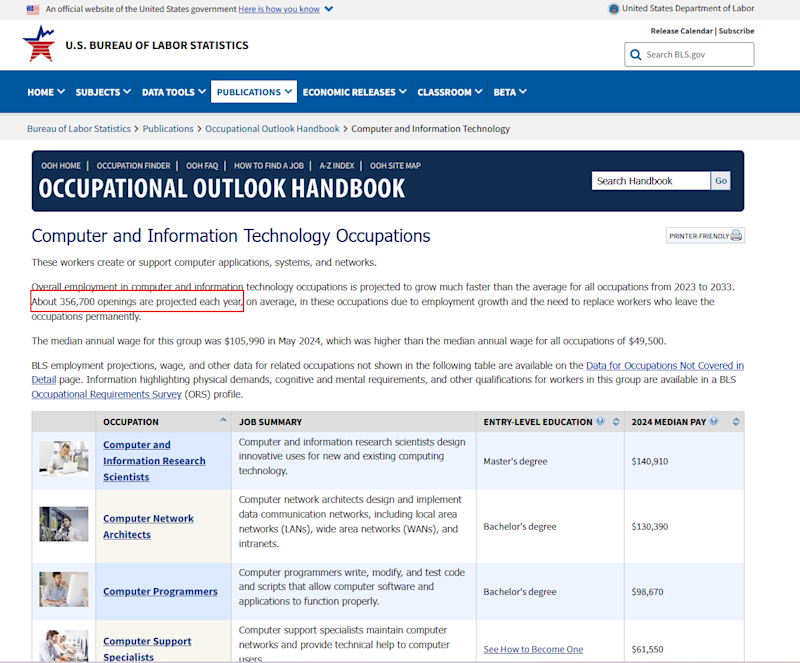
That’s way more than average, with some areas of tech growing even faster than others.
To put this into perspective:
The average growth rate for all jobs is around 3%
But tech is around 11% on average
While specific areas in tech like Cybersecurity are growing at a whopping 33%
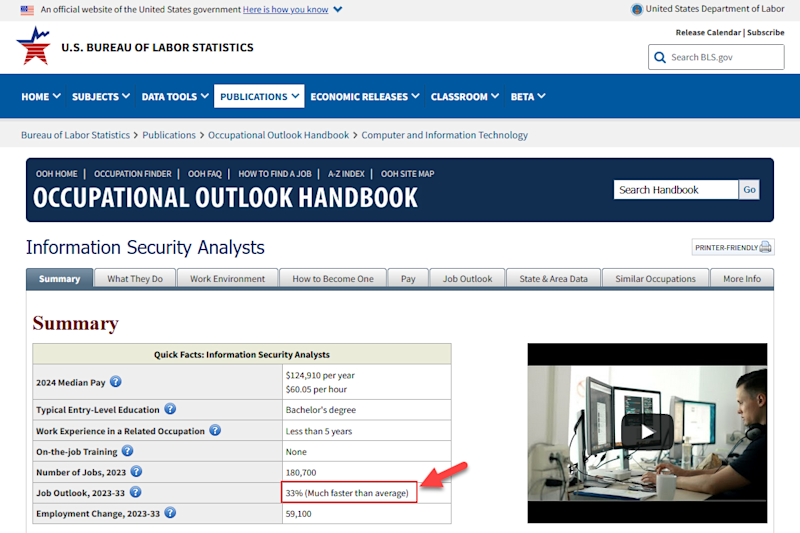
The lifestyle and flexibility are hard to beat
One of the biggest perks of working in tech is the flexibility it gives you, because remote and hybrid roles are common. Heck they were invented in the tech industry!
Not only that but many teams work asynchronously, so you don’t always need to be online from 9 to 5. That gives you more control over your schedule and your day-to-day life which can be huge to your quality of life. Look after the kids in the day and work in the afternoon etc.
It’s also a field that tends to value outcomes over hours, so if you can get your work done and communicate well, you’re usually trusted to manage your time how you want.
Of course, this depends on the company. Some still work like it’s 1995, but more often than not, tech jobs come with a level of freedom and work-life balance that’s hard to find elsewhere.
And that’s not even counting the extras like on-site perks, flexible benefits, employee stock options, and more. There’s real upside if you land in the right place.
There’s a role for almost every type of person
You don’t have to be a math genius or love writing code to work in tech. One of the best things about the industry is how wide the range of roles is:
If you’re more visual or creative, you might enjoy product design, UI/UX design, or front-end development
If you like solving problems and digging into how things work, you might gravitate toward QA testing, DevOps, or Cybersecurity
If you like spotting patterns or working with numbers, Data Analysis and Data Science could be a great fit
There are even roles focused on communication and organization, like technical writing, product management, or Data Engineering
The key thing to understand is that tech isn't one type of job. It's a whole ecosystem. That means there's a good chance something in it will line up with how your brain works.
Remember: If you’re not sure the best role for you and your interests and goals, you can take our tech career path quiz.
Want a career in tech but not sure what to do?
- Find the perfect career path for you based on your experience and goals
- Get a personalized step-by-step roadmap to follow
- Go from zero to hired in your dream career
- 👇 Take our free, 2-minute quiz to make it happen
All you have to do is answer some questions and then it’ll give you its best recommendation for you, as well as links to specific roadmaps and resources so you can literally start learning the skills required for your new role in the next 5 minutes.
That’s how quickly you can take action in this industry and why I think it’s so awesome for almost anyone.
That being said, there are some cons to working in tech. For the right people, they might even feel like pros, but they’re still worth knowing about.
The cons of working in tech
So let’s walk through a few of the common downsides so you can get the full picture.
You’ll need to keep learning
One of the biggest realities of working in tech is that things change, and some of the tools you use today might be outdated in a year or two. New frameworks pop up all the time, and what’s in demand now might not be in five years.
That doesn’t mean you have to reinvent yourself every few months, but it does mean you can’t really coast.
You’ll need to keep your skills sharp, stay curious, and be willing to learn as you go. Most companies don’t expect you to know everything, but they do expect you to keep up.
It’s not as hard as it sounds, and for some people, this is actually a pro of being in this industry because they love the variety and the sense that they’re always improving. Trust me, I’ve done a lot of jobs where you learn the skills in 2 weeks and repeat that for the next 10 years and that sucks.
Being able to keep skilling up means you’re never bored, and you’re able to keep getting significant pay increases.
For example
A lot of people freaked out when all these AI tools came out, because they thought AI would take their job. This isn’t true, and a lot of people were hesitant to learn them.
However, the tech professionals that have embraced the tools have found they can make their lives far easier and are more efficient. We interviewed our audience of 500,000+ tech professionals and some of them were helping to speed up anywhere from 30-70% of their work!
As you can imagine, this has led to multiple job postings asking for AI as an added skill to their current foundations. It’s also why we teach it in our roadmaps alongside the core skills for any role, as well as have a specialized course on Prompt Engineering.
However, for some people this process of learning new skills can feel exhausting, especially if they’re coming from a field where once you’re trained, you’re good to go.
But honestly? It’s manageable. If you follow a solid, up-to-date roadmap so that you enter the industry with the right skills, you’re not going to have to relearn everything every year. You just need to be open to staying aware of what’s happening.
Easy!
Heck, you can even talk your boss into paying for you to keep learning.
It can take effort to land your first job
Remember how I said earlier that you don’t need a degree to get hired in tech, but you do need to prove you can do the work?
Because of this, there’s a few more hoops to jump through than other jobs by creating a project portfolio and answering technical questions during an interview.
It’s not that hard, but it is extra work to what you would have done before so we have to address that. Although remember, it does let you bypass the degree.
The other thing is competition.
Because tech jobs pay insanely well and have all those other pros, you’re going to get some competition when you apply, which means you might have to apply for a few jobs before you get hired.
Again, all jobs have this, but it might take a month or so to lock a job down.
We’ve seen people get hired on their first application, and some have even been headhunted from sharing their project work before they even apply to roles. However, you need to be aware of these things going in.
The culture isn’t always perfect
There’s a lot to love about tech culture. It’s flexible, often remote, and generally focused on outcomes over hours. But that doesn’t mean it’s perfect.
Like every industry, some employers are better than others. So while a lot of them are remote, hybrid, async and awesome, you also get companies that want you in the office 9-5.
For some people this is great as they prefer to be around others and a strict schedule. In fact, they struggle working remotely and being disciplined to get their work done. For others though it can suck when you come into this expecting a totally new way of working.
Then there’s the fast pace. Tech moves quickly, and some teams expect you to keep up by working late or responding to messages outside of hours. It’s not always like this, and plenty of companies are pushing back against it, but the pressure still exists in some corners.
The key that I found with most of these companies is that they really value self ownership, i.e. if you make a mistake, you need to own up to it and fix it.
They don’t want people who pass the buck. Not because they want to punish people, but when you have ownership like this, your work is usually of a much higher quality and level of professionalism.
The good news is that you can choose your environment. There are thousands of companies hiring in tech, and not all of them operate the same way. If culture and balance matter to you, you can look for roles that value those things just as much as you do.
But it’s important to know that the vibes can vary a lot, so don’t assume that every tech job is like working at Google. Some are amazing. Some are a bit chaotic. The key is knowing what kind of team you’re looking for and asking the right questions when the time comes.
I have friends working as 1 of only 3 tech employees at a company and mainly they just keep the lights on, make sure it all runs smoothly, and update things. It’s far less stressful but also far lower pay than other tech companies.
The trick is to find the company that fits you best. But like I said, the good news is there are literally thousands of them to choose from!
Learning to code is hard at first
Learning any new skill is hard, especially if you don’t have any prior experience.
For example
Let's say you want to learn Klingon. (Or any foreign language).
There’s a steep initial curve to get started, but once things begin to click, it all gets easier with time. The thing is, most people haven’t tried learning something this different before, so it’s totally normal for it to feel overwhelming at first.
Even if you’re following a solid roadmap or course, you’re going to hit a few walls. Some things just won’t make sense right away. You’ll question whether this is for you, and that’s okay.
That’s also why I don’t recommend doing this totally on your own.
When you’re stuck in your head or spinning your wheels, it helps so much to have a community to lean on. People you can bounce questions off, share wins with, or hear “I struggled with that too” from. It makes the whole thing feel way more doable.
That's why we built a community here at ZTM, because we know it's such a huge factor in helping you succeed:
It's great to be able to chat with people and get past sticking points. Because once it does click, it really clicks. and you’ll start solving problems that felt impossible a week ago.
It's crazy how much that can build your confidence and then speed up everything else. The trick is to keep going. A little better each day is more than enough.
So... is tech a good career path for you?
As you can see, tech offers a fantastic career path with a lot of benefits.
There’s great salaries, flexibility, fast growth, and a whole slew of different fields to focus in. However, like anything worth doing it does take effort. You’ll need to learn new skills, stay up to date, and push through moments where it all feels new and confusing.
It can honestly change your life in ways you wouldn't even imagine. You just have to get started.
Here’s how:
If you already know what area of tech you want to focus on, check out our roadmaps here. They share the best resources and the fastest path to go from zero experience to being hired this year
And if you’re not sure the best one of these for you, then click here to check out our tech career path quiz. Answer the questions, and find out the best recommendation for you and your goals
So what are you waiting for? Start that new career today!
Best articles. Best resources. Only for ZTM subscribers.
If you enjoyed this post and want to get more like it in the future, subscribe below. By joining the ZTM community of over 100,000 developers you’ll receive Web Developer Monthly (the fastest growing monthly newsletter for developers) and other exclusive ZTM posts, opportunities and offers.
No spam ever, unsubscribe anytime













